Beyond the Environmental Summit, Dec 2015 Paris, -- do more !
|
How can we prevent countries and corporations, which own
the planet’s remaining reserves of coal, gas and oil from ever being allowed
to dig most of it up?
We need to
Keep it in
the ground video
 
( by The Guardian
KEEP IT IN THE GROUND)
and:
- An immediate Moratorium on the
Exploration for new reserves.
- Define a Global LIMIT for the extraction of
fossil fuels from existing reserves, with an end date and
schedule for every coal, oil, and gas LOCATION.
Meanwhile prioritize on
locations where production is cheapest.
- Make Laws for Monitoring and Enforcement
which must include extreme penalties on those corporations and countries
that don't comply.
-
Abolish all Fossil Fuel Corp. SUBSIDIES and
apply them to RENEWABLES Incentives.
Intergovernmental Panel on
Climate Change IPCC worked on the PARIS AGREEMENT.
 #ClimatParis2015 #ClimatParis2015
 #COP21
#COP21
They used IIASA
as consultants -
Email them. |
The Climate Crisis needs you !

Citibank Report Aug 2015:
"The cost of following a low carbon route
is actually cheaper than Inaction "
DIVESTMENT:
Trusts, investment specialists, universities, pension funds and businesses
need to take their money away from the companies plunging us into a
death spiral.
UN: We need to End New Coal
G20 countries paying $1,000 per citizen in fossil fuel subsidies
Time to put a FLOOR on the price of Gas before
Oil drops below $35 a barrel.
A CARBON TAX.
USA's
Subsidies Loans |
|
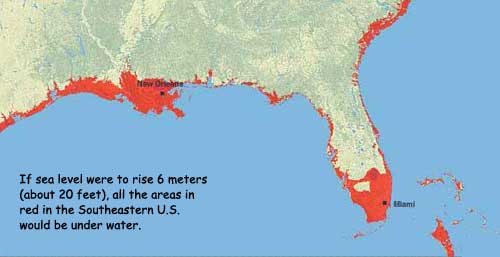
Sea level rise will swallow Miami, New Orleans no matter what we do, study
findsDecember 2015, the nations of the world
assembled in Paris, as they did previously in Rio, Copenhagen and Kyoto.
Did they find the right actions, where they have failed before?
 | who is got the subsidies |
 | who is did the lobbying? |
 | who are the worst polluters ? |
 | who still funds them? |
Myths and Realities about
Wind, Water and Sun versus
Fossil Fuels
Stanford Study of 100% RENEWABLES Energy future for USA |
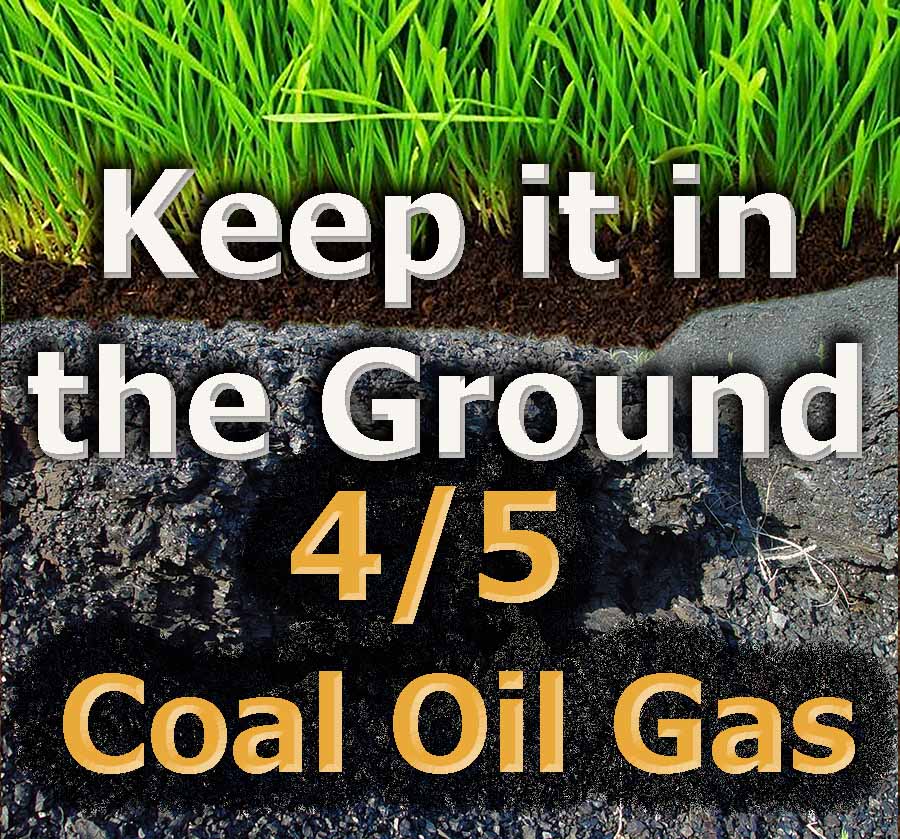
Worldwide Fossil Reserves that must remain buried:
source (the Guardian) |
Reserves to remain buried
% of |
Coal |
Gas |
Oil |
| USA |
92 |
4 |
6 |
| Africa |
85 |
33 |
21 |
| Australia |
90 |
61 |
38 |
| China & India |
66 |
63 |
25 |
| Ex-Soviet |
94 |
50 |
85 |
| Arctic |
|
|
100 |
|
|
|
|
Rating Countries on their
Pledges prior to Paris (source) |
|
|
Medium
|
Inadequate
|
Not rated
|
| Fully consistent with below 2°C
limit. |
Not consistent with
limiting warming below 2°C as it would require many other countries to
make a comparably greater effort and much deeper reductions. |
If all governments put forward
this inadequate position, then warming likely to exceed 3–4°C. |
|
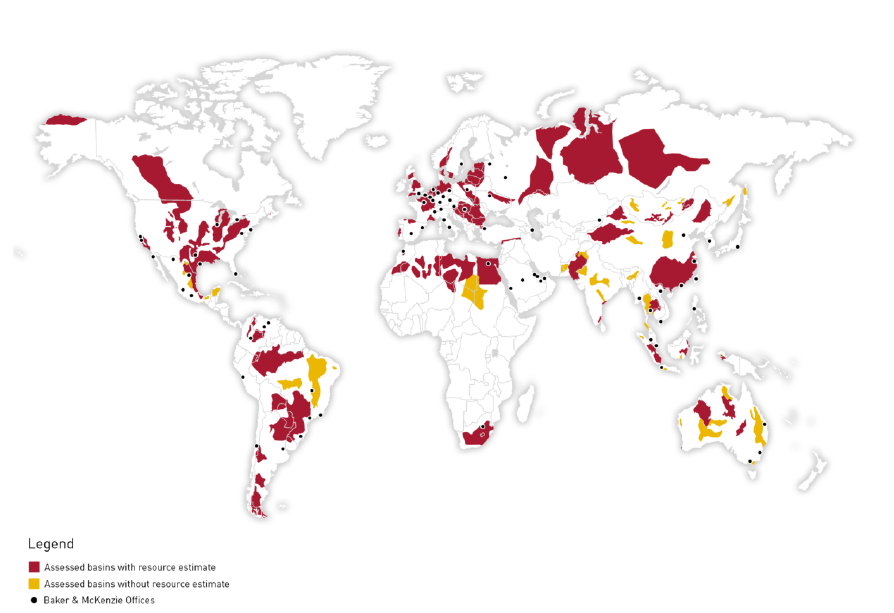
Shale Oil & Shale Gas
LOCATIONS
New Pipelines Evade Federal Regulation
More than a half a million miles of new pipeline will be built in the United States by 2035, industry projections anticipate the need for half a trillion --
yes, trillion -- dollars of investment in systems to move oil and gas around
the country over the next twenty years.
More than a hundred major pipeline projects are currently
planned for the next five years in North America.
Right now, each federal inspector is responsible for almost enough pipeline
to circle the earth. With the addition of hundreds of thousands of extra
miles, it's not clear how they’ll be able to keep up.
http://insideenergy.org/2014/08/01/leaky-barrels-german-u-boats-and-2-6-million-miles-of-pipe
$1.1 Trillion being gambled on $95 per barrel oil
2015-2025 Natural Gas plants to be surplus to
requirements:- $82 billion in Canada, $71bn in the US and $68bn in
Australia, with the rest of the world, led by
Russia and Indonesia, accounting for the remaining $59bn.
(Shell is the biggest player in the market and $85bn would not be needed).
Natural gas
has been touted as an environmentally friendly substitute to coal and oil
production, but a
new report estimates enough gas is leaking to negate most of the
climate benefits. Methane leaks at natural gas sites can make the
process nearly or as carbon-intensive as coal.
Video:"chasing
methane" "years of living dangerously" In the 3 places it has been
measured, Denver, Utah and Los Angeles methane emission from Natural Gas
production far exceeds the Green House Equivalent of Coal.
How can we curb the HUGE
US export of
liquid Natural Gas that causes an increase in
price at home?
Database of global Exploration
|
|
Earth Killers
|
Exxon Mobil  BHP Billiton BHP Billiton
 Exxaro Exxaro
 |
BP
 Anglo American Anglo American
 Lukoil Lukoil
 ConocoPhillips ConocoPhillips
 |
Gazprom
 Standard Chartered Bank Standard Chartered Bank

| Loans to Oil & Gas Companies: |
$ Billion |
to UN:
Oil & Gas CEOs declare action on climate change
BG Group, BP, Eni, Pemex, Reliance Industries, Repsol,
Saudi Aramco, Shell, Statoil and Total
|
| Citigroup |
22 |
| JP Morgan Chase |
44 |
| Bank of America |
22 |
| Wells Fargo |
17 |
|
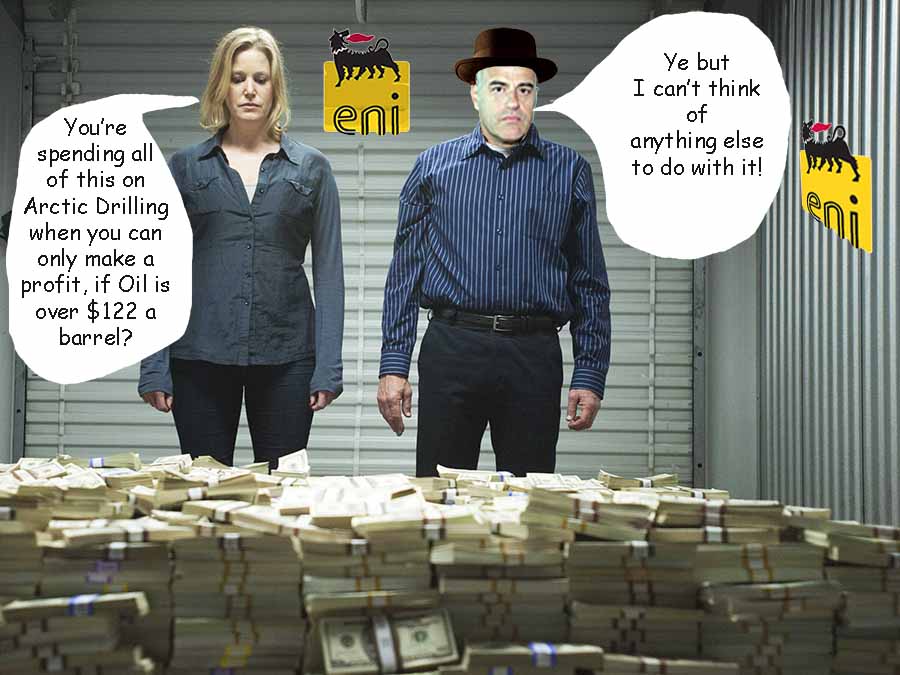
CRAZY Italian Oil Corp, Eni,
 continues to
explore in the Arctic even knowing they need Oil to be $122 a barrel just to
break even !
continues to
explore in the Arctic even knowing they need Oil to be $122 a barrel just to
break even !
IMF study June
2015: a massive $5.3 trillion
is spent worldwide on fossil fuel subsidies
each year, or about 6.5 percent of global Gross Domestic Product
(GDP). The report predicts that
carbon dioxide emissions would fall by around 20 percent if these
subsidies were scrapped. This adds to previous research which has also
identified that fossil fuel subsidies stunt economic growth.
Mar 24, 2015
Private equity firm Quantum Energy Partners
will invest up to $1 billion in a new entity for acquisition and development
of oil and gas assets that will be managed by Linn
Energy LLC (LINE.O).
February 3, 2015 – Quantum Energy Partners
formed Rio Oil and Gas II, LLC -- $350 million
invested.
Drummond
Global coal
Coal mining in India
Vast amounts of oil in the
Middle East, coal in the
US, Australia and
China and many other fossil fuel reserves will have to be left in the
ground to prevent dangerous climate change.
New research identifies which reserves must not be burned to keep
global temperature rise under
2C, including over 90% of
US and Australian
coal and almost all
Canadian tar sands.
Major fossil fuel companies face the risk that significant parts of their
reserves will become worthless, with Anglo American,
BHP Billiton and Exxaro
owning huge coal reserves and
Lukoil, Exxon Mobil,
BP, Gazprom and
Chevron owning massive
oil and gas reserves.
The Middle East is still required to leave
260 billion barrels of oil in the ground, an
amount equivalent to Saudi Arabia’s entire
oil reserve.
Canada’s oil sands
production must fall to zero after 2020 if the 2C
scenario is to be fulfilled.
In 2013,
fossil fuel
companies spent $670
billion (£443bn) on exploring for new
oil
and
gas resources.
banks with a high proportion of
loans to oil and gas companies, include BOK
Financial, Hancock Holding, Comerica, Texas Capital Bancshares and
Cullen/Frost Bankers, according to Moody's, |
Oil prices are now too low for OPEC countries to cover their spending.
Oil prices needed to meet
budgeted expenditure ($/bbl)
OPEC Country 2013
Algeria
119
Angola
94
Ecuador 122
Iran
136
Iraq
116
Kuwait
59
Libya
111
Nigeria
124
Qatar
58
Saudi Arabia 92
UAE
90
Venezuela 117 |
Cost of producing one new
barrel of oil
Region
Dollars per barrel ($/bbl)
Arctic
115-122
Brazil Ethanol
63-69
Central and South America
29-35
Deepwater Offshore
54-60
EU Biodiesel
106-113
EU Ethanol
98-105
Middle East Onshore
10-17
North Sea
46-53
Oil Sands
89-96
Former Soviet Union Onshore
18-25
Russia Onshore
15-21
US Ethanol
80-87
US Shale Oil
70-77
WAF Offshore
38-44 |
The budget needs of oil producers are generally much higher than their marginal
operating costs, calculated as the cost of producing one extra barrel of crude oil
from an existing field. source Reuters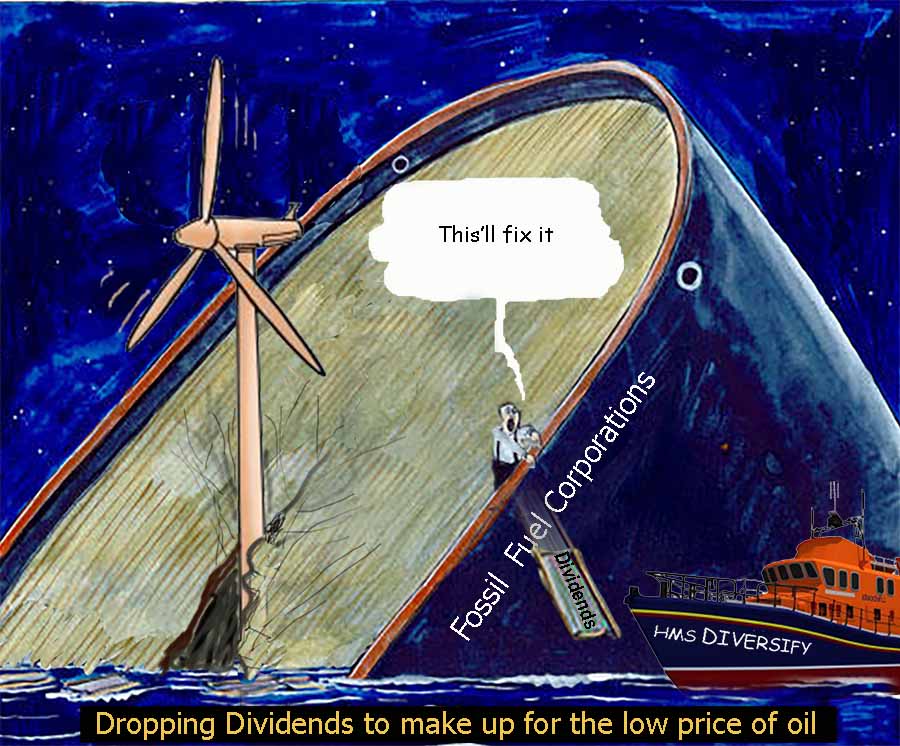
|
|
Pemex can no longer fund
shale
oil exploration and the
Mexican Government is auctioning oil
exploration rights.
There are
139 billion barrels from untapped deposits,
the
Biggest Oilfield in the world.
Mexico needs more than
40,000 new wells to develop its virgin shale
fields, with each well costing $10 to $20 million.
Round One is shallow water in the Gulf ! Fracking is required which uses
tremendous amounts of water.
This
Mexican Auction is
our next equidistant "KXL type" disaster ! We must
attack every
attempt to invest in this !
Sep30th 2015 Bid winners:
Baker &
McKenzie, GBM &
Deloitte are working with companies to invest.
Going beyond Europe, research conducted by Norwegian consultancy
Rystad Energy
indicates that 800 projects with a cumulative
headline valuation of $500 billion await FID.
Some of these are unlikely to be profitable below $70 a barrel.
Wood
Mackenzie has identified 32 projects from Barents Sea to the
Mediterranean awaiting a nod on investment totaling £55 billion.
63 percent of the carbon dioxide and methane emitted between 1854 and 2010
to just 90 entities
HilCorp Alaska LLC |
Methane Leaks in Oil Production
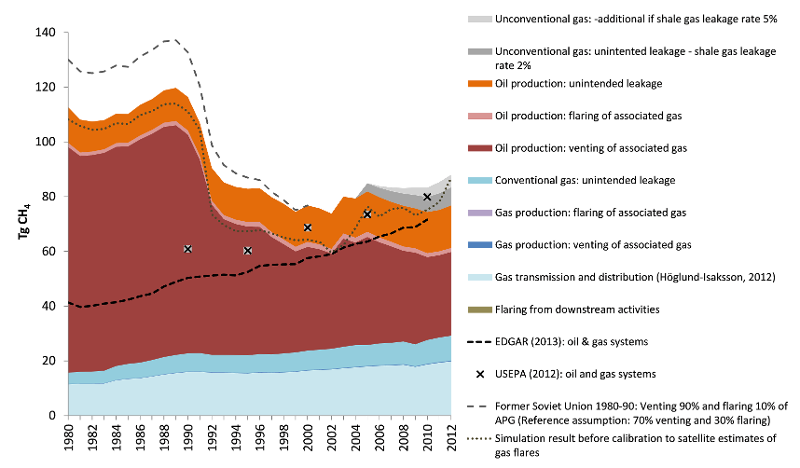
|
2012 Environmental Summit
was a crime scene - a planet straight out of science fiction - +11oF
(6oC) by 2050
 |
A third of summer sea ice in the Arctic
is gone, |
 |
The oceans are
30 percent more acidic, |
 |
June broke or tied 3,215
high-temperature records across the United States. |
 |
the warmest May on record for
the Northern Hemisphere |
 |
the 327th consecutive month in
which the temperature of the entire globe exceeded the 20th-century
average ( for the last 27 years that is) |
 |
this spring was the warmest
ever recorded for USA ( the "largest temperature departure from
average of any season on record." |
 |
it rained in Mecca despite a
temperature of 109 degrees, the hottest downpour in the planet's
history. |
 | The week after the
Rio conference limped to its conclusion,
Arctic sea ice hit the lowest
level ever recorded for that date. |
 | Last month, on a
single weekend, Tropical Storm Debby dumped more than 20 inches of
rain on Florida – the earliest hurricane ever. |
 | At the same time, the
largest fire in New Mexico history burned on, and |
 | the most destructive
fire in Colorado's history claimed 346 homes in Colorado Springs
|
 | a heat wave across
the Plains and Midwest broke records that had stood since the Dust
Bowl, threatening this year's harvest. |
 |
an ocean species collapse from the top of the food chain down |
|
Older
News |
|
Stanford Study of alternative energy future for California & New York
State
Leave fossil fuels buried to prevent climate change, study urges
Scientific consensus: Earth's climate is
warming
http://climate.nasa.gov/scientific-consensus/
https://www.skepticalscience.com/argument.php
Global surface temperature Graph
Nov 19, 2012 The World Bank
warns that “we’re on track for a 4°C increase.
California
CAP and TRADE started Nov 13th 2012
The International Energy Agency said, “No more than
one-third of proven reserves of fossil fuels can be consumed prior to
2050 if the world is to achieve the 2 °C goal”
|
| Not that our leaders seemed to notice
-- June 2012 the world's nations, meeting in
Rio
for the 20th-anniversary return of the 1992
Environmental Summit,
accomplished nothing. It was a
ghost of a meeting relative to 20 years
ago, no one paid it
much attention.
For the past year, an easy and powerful bit of
arithmetical analysis upends most of the
political denials about climate change. And it allows us
to understand our precarious position with three simple numbers: |
Republican Deniers |
|
1. 2° Celsius
2. 565
CO2
3. 2,795
Gigatons CO2 |
-
-
- |
We must stay below
We need
to emit no more
by
midcentury
the amount of carbon already contained in the proven
coal and oil gas reserves of the fossil-fuel companies |
|
|
The First Number: 2° Celsius
This was our chance. It could take years before we get a
new and better one, If ever.
Copenhagen
failed spectacularly.
Neither China nor the United
States, which between them are
responsible for 40 percent of global carbon emissions, was prepared to
offer dramatic concessions, and so the conference drifted
aimlessly for two weeks until world leaders jetted in for the final day.
It’s purely
voluntary agreements committed no one to
anything, there was no enforcement mechanism. "Copenhagen is a crime scene tonight," an
angry Greenpeace official declared, "with
the guilty men and women fleeing to the airport." Headline writers were
equally brutal: COPENHAGEN: THE MUNICH OF
OUR TIMES? asked one.
The accord did contain one important number, however.
It formally recognized "the scientific view that
the increase in global temperature should
be below two degrees Celsius."
"we agree that deep cuts in global emissions are required... so as to
hold the increase in global temperature below two degrees Celsius." By
insisting on two degrees – about 3.6 degrees Fahrenheit – the accord
ratified positions taken earlier in 2009 by the G8,
and the so-called Major Economies Forum.
So far, we've raised the average temperature of the
planet just under
0.8 degrees Celsius, and that has caused
far more damage than most scientists expected. (A third of summer
sea ice in the Arctic is gone, the
oceans are
30 percent more acidic, and since
warm air holds more water vapor than cold, the atmosphere over the
oceans is a shocking five percent wetter, loading the dice for
devastating floods.) Given those impacts, in fact, many scientists have
come to think that two degrees is far too lenient a target. "Any number much above one degree involves a gamble,"
writes Kerry Emanuel of MIT, a leading authority on hurricanes, "and the
odds become less and less favorable as the temperature goes up." Thomas
Lovejoy, once the World Bank's chief biodiversity adviser, puts it like
this: "If we're seeing what we're seeing today at 0.8 degrees Celsius, two degrees is simply
too much." NASA scientist James
Hansen, the planet's most prominent climatologist, is even blunter: "The
target that has been talked about in international negotiations for two
degrees of warming is actually a prescription for long-term disaster."
At the Copenhagen summit, a spokesman for
small island nations warned that many would
not survive a two-degree rise: "Some countries will flat-out disappear."
When delegates from developing nations were
warned that two degrees would represent a "suicide pact" for
drought-stricken Africa, many of them
started chanting, "One degree, one Africa."
Despite such well-founded misgivings, political
realism bested scientific data, and the world settled on the two-degree
target – indeed, it's fair to say that it's the only thing about climate
change the world has settled on. All told, 167
countries responsible for more than 87 percent of the world's
carbon emissions have signed on to the Copenhagen
Accord, endorsing the two-degree target. Only a
few dozen countries have rejected it,
including Kuwait,
Nicaragua and Venezuela. Even the
United Arab Emirates, which makes most of
its money exporting oil and
gas, signed on.
The Second Number: 565 Gigatons CO2
Scientists estimate that humans can pour roughly 565 more
gigatons of carbon dioxide into the atmosphere
by midcentury and still have some reasonable hope of staying
below two degrees.
This idea of a global "carbon
budget" emerged about a decade ago, as scientists began to
calculate how much oil, coal and
gas could still safely be burned. Since
we've increased the Earth's temperature by 0.8 degrees so far, we're
currently less than halfway to the target. But, in fact, computer models
calculate that even if we stopped increasing CO2 now, the
temperature would likely still rise another 0.8 degrees, as previously
released carbon continues to overheat the atmosphere. That means we're
already three-quarters of the way to the two-degree target.
"There's maybe 40 models
in the data set now, compared with 20 before. But so far the numbers are
pretty much the same.
We've continued to pour record amounts of carbon into
the atmosphere, year after year. The International
Energy Agency published its latest figures – CO2
emissions last year rose to 31.6 gigatons, up 3.2 percent from the year
before. China kept booming, so its carbon
output (which recently surpassed the U.S.)
rose 9.3 percent; the Japanese shut down
their fleet of nukes post-Fukushima, so their emissions edged up 2.4
percent.
In fact, study after study predicts that carbon
emissions will keep growing by roughly three percent a year – and at
that rate, we'll
blow through our 565-gigaton allowance in 16 years. "The door to
a two-degree trajectory is about to close, the trend is perfectly in
line with a temperature increase of about six degrees."
That's almost
11 degrees Fahrenheit, which would create
a
planet straight out of science fiction. |
|
|
The Third Number: 2,795
Gigatons CO2
This
number is the scariest of all –by the
Carbon Tracker Initiative, a team of London financial
analysts and environmentalists who
published a report in an effort to educate investors about the
possible risks that climate change poses to their stock portfolios.
The number describes
the amount of
carbon already contained in the proven coal and oil and gas reserves
of the fossil-fuel companies, and the countries
(think Venezuela or
Kuwait) that act like
fossil-fuel companies. It's the fossil fuel we're currently
planning to burn. And the key point is that this new number –
2,795 – is Five times higher than 565.
We have five times as much
oil and coal
and gas on the books as
climate scientists think is safe to
burn.
We'd have to keep 80 percent of those reserves
locked away underground to avoid that fate. Our
fate seems certain. |
 |
 |
Yes, this coal and
gas and oil
is still
technically in the soil. But it's already economically aboveground
– it's figured into share prices, companies are borrowing
money against it, nations are basing their budgets on the presumed
returns from their patrimony. It explains why the big fossil-fuel
companies have fought so hard to prevent the regulation of carbon
dioxide – those reserves are their primary asset, the holding that
gives their companies their value. It's why they've worked so hard
these past years to figure out how to unlock the oil in
Canada's Tar Sands, or how to drill
miles beneath the sea, or how to frack
the Appalachians. If you told
Exxon or Lukoil
that, in order to avoid wrecking the climate, they couldn't pump out
their reserves, the value of their companies would plummet. John
Fullerton, a former managing director at JP Morgan who now runs the
Capital Institute, calculates that at today's market value, those 2,795 gigatons of carbon emissions are worth
about $27 trillion. Which is to say, if you paid
attention to the scientists and kept 80 percent of it underground,
you'd be writing off $20 trillion in assets.
But if we burn all that
carbon, the planet will crater – end of story.
|
|
| Put a
price on carbon
We need to view the
Fossil-Fuel
Industry in a new light. It has become a rogue industry, reckless
like no other force on Earth. It is
Public Enemy
Number One to the survival of our planetary civilization.
Wrecking the planet is their business model. It's what
they do."
Left to our own devices, citizens might decide to
regulate carbon and stop short of the brink; according to a recent poll,
nearly two-thirds of Americans would back an international agreement
that cut carbon emissions 90 percent by 2050. But we aren't left to our
own devices. The
Koch brothers, for instance, have a
combined wealth of $50 billion. They've made most of their money in
hydrocarbons, they know any system to regulate carbon would cut those
profits, and they reportedly plan to lavish as much as
$200 million on this year's elections.
In 2009, for the first time, the U.S.
Chamber of Commerce surpassed both
the Republican and Democratic National Committees on
political spending; the following year, more than
90 percent of the
Chamber's cash went to Republican candidates, many of whom deny the
existence of global warming. Not long ago, the Chamber even
filed a brief with the EPA urging the agency not to regulate carbon –
should the world's scientists turn out to be right and the planet heats
up, the Chamber advised, "populations can acclimatize to warmer climates
via a range of behavioral, physiological and technological adaptations."
As radical goes, demanding that we change our physiology seems right up
there.
BP closed its solar
division.
Shell shut down its solar
and wind efforts in 2009. The five biggest oil companies have
made more than $1 trillion in profits since the millennium – there's
simply too much money to be made on oil and gas and coal to go chasing
after sunbeams.
Much of that profit stems from -- alone among
businesses, the fossil-fuel industry is
allowed to dump its main waste, carbon dioxide, for free. Nobody else gets that break – if you own
a restaurant, you have to pay someone to cart away your trash. Now that
we understand that
carbon is
heating the planet and acidifying the oceans, its price becomes the
central issue.
If you put a price on carbon, through a direct tax or
other methods, it would enlist markets in the fight against global
warming. Once Exxon has to pay
for the damage its carbon is doing to the atmosphere, the price of its
products would rise. Consumers would get a strong signal to use less
fossil fuel – every time they stopped at the pump, they'd be reminded
that you don't need a semi-military vehicle to go to the grocery store.
The economic playing field would now be a level one for nonpolluting
energy sources. And you could do it all without bankrupting citizens – a
so-called "fee-and-dividend" scheme would put a hefty tax on coal and
gas and oil, then simply divide up the proceeds, sending everyone in the
country a check each month for their share of the added costs of carbon.
By switching to cleaner energy sources, most people would actually come
out ahead.
If student’s college endowment and pension funds have
fossil-fuel stock, then their being subsidized by investments that
guarantee an unlivable planet. "Given the severity of the climate
crisis, a comparable demand that our institutions dump stock from
companies that are destroying the planet would not only be appropriate
but effective," "The message is simple:
We must sever the
ties with those who profit from climate change – now."
To make a real difference – to keep us under a
temperature increase of two degrees –
you'd need
to instigate carbon pricing legislation in Washington, and then
use that to spread around the world. At this point, what
happens in the U.S. is most important for how it will influence China
and India, where emissions are growing fastest.
We
know how much we can burn, and we know who's planning to burn more.
We're
losing the fight, badly and quickly – losing it because, most of all, we
remain in denial about the peril that human civilization is in.
This synopsis is from the August 2nd, 2012 issue of
Rolling Stone by
Bill McKibben July 19, 2012 9:35 AM
ET
http://www.rollingstone.com/politics/news/global-warmings-terrifying-new-math-20120719#ixzz21DHQFxSM
The Economist Unburnable fuel -- Either governments are not serious
about climate change or fossil-fuel corps are overvalued
|
SUPPLEMENTAL
|
The charade will continue in November, when the next
Conference of the Parties (COP)
of the U.N. Framework Convention on Climate
Change convenes in Qatar. This will be COP 18 – COP 1 was
held in Berlin in 1995, and since then the process has accomplished
essentially nothing.
"The message has been consistent for close to 30 years now,"
Collins says with a wry laugh, "and we have the instrumentation and
the computer power required to present the evidence in detail.
So far, though, such calls have had little effect.
We're in the same position we've been in for a
quarter-century: scientific warning followed by political inaction.
|
According to the
Carbon Tracker Report,
Oil Companies:
 | Exxon
burns its current reserves, it would use up more than seven
percent of the available atmospheric space between us and the
risk of two degrees. |
 | BP is
just behind, followed by the |
 | Russian firm Gazprom,
then |
 | Chevron, ConocoPhillips and Shell, each of which
would fill between three and four percent. |
Taken together, just these six firms, of the 200 listed in the
Carbon Tracker report, would use up more than a quarter of the
remaining two-degree budget.
Coal Companies:
 | Severstal, the Russian mining giant, leads the list of coal
companies, followed by firms like |
 | BHP Billiton
and |
 | Peabody.
|
The numbers are simply staggering – this industry, and
this
industry alone, holds the power to change the physics and chemistry
of our planet, and they're planning to use it.
They're bidding on all those oil leases made possible by the
staggering melt of Arctic ice. And yet they relentlessly search for
more hydrocarbons – in early March, Exxon
CEO Rex Tillerson told Wall Street analysts that the company plans
to spend $37 billion a year through 2016 (about $100 million a day)
searching for yet more oil and gas.
There's
not a more reckless man on
the planet than Tillerson. Late last month, on the
same day the Colorado fires reached their height, he told a New York
audience that global warming is real, but dismissed it as an
"engineering problem" that has "engineering solutions." Such as?
"Changes to weather patterns that move crop-production areas around
– we'll adapt to that." This in a week when Kentucky farmers were
reporting that corn kernels were "aborting" in record heat,
threatening a spike in global food prices. "The fear factor that
people want to throw out there to say, 'We just have to stop this,'
I do not accept," Tillerson said. Of course not – if he did accept
it, he'd have to keep his reserves in the ground. Which would cost
him money. It's not an engineering problem, in other words –
it's a greed
problem.
|
|
Actions to take
So far,
environmental efforts to tackle global warming have failed. The
planet's emissions of carbon dioxide continue to soar, especially as
developing countries emulate (and
supplant) the industries of the West. Even in rich countries, small
reductions in emissions offer no sign of the real break with the
status quo we'd need to upend the iron logic of these three numbers.
Germany is one of the only big
countries that has actually tried hard to change its energy mix; on
one sunny Saturday in late May, that northern-latitude nation
generated
nearly half its power from solar panels. That's a small
miracle – and it demonstrates that we have the technology to solve
our problems. But we lack the will. So far,
Germany's the exception; the rule is ever more carbon.
This record of failure means we know a lot about what strategies
don't work.
Green groups, for instance, have spent
a lot of time trying to change individual lifestyles: the iconic
twisty light bulb has been installed by the millions, but so have a
new generation of energy-sucking flatscreen TVs. Most of us are
fundamentally ambivalent about going green: We like cheap flights to
warm places, and we're certainly not going to give them up if
everyone else is still taking them. Since all of us are in some way
the beneficiaries of cheap fossil fuel.
People perceive – correctly – that their individual actions will
not make a decisive difference in the atmospheric concentration of
CO2; by 2010, a poll found that "while
recycling is widespread in America and
73 percent of those polled are paying bills online in order to save
paper," only four percent had reduced their
utility use and only three percent had purchased hybrid cars. Given a hundred years, you
could conceivably change lifestyles enough to matter – but time is
precisely what we lack.
A more efficient method, of course, would be to work through the
political system, and environmentalists have tried that, too, with
the same limited success. They've patiently lobbied leaders, trying
to convince them of our peril and assuming that politicians would
heed the warnings. Sometimes it has seemed to work. Barack Obama,
for instance, campaigned more aggressively about climate change than
any president before him – the night he won the nomination, he told
supporters that his election would mark the moment "the rise of the
oceans began to slow and the planet began to heal." And he has
achieved one significant change: a steady increase in the fuel
efficiency mandated for automobiles. It's the kind of measure,
adopted a quarter-century ago, that would have helped enormously.
But in light of the numbers I've just described, it's obviously a
very small start indeed.
At this point,
effective
action would require actually keeping most of the carbon the
fossil-fuel industry wants to burn safely in the soil,
not just changing slightly the speed at which it's burned. And there
the president, apparently haunted by the still-echoing cry of
"Drill, baby, drill," has gone out of his way to
frack and mine. His secretary of
interior, for instance, opened up a huge swath of the
Powder River Basin in
Wyoming for coal
extraction: The total basin contains some 67.5 gigatons worth
of carbon (or more than 10 percent of the available atmospheric
space). He's doing the same thing with Arctic and offshore drilling;
in fact, as he explained on the stump in March, "You have my word
that we will keep drilling everywhere we can... That's a commitment
that I make." The next day, in a yard full of oil pipe in Cushing,
Oklahoma, the president promised to work on
wind and solar energy but, at
the same time, to speed up fossil-fuel development: "Producing more
oil and gas here at home has been, and will continue to be, a
critical part of an all-of-the-above energy strategy." That is, he's
committed to finding even more stock to add to the 2,795-gigaton
inventory of unburned carbon.
Sometimes the irony is almost Borat-scale obvious: In early June,
Secretary of State Hillary Clinton traveled on a Norwegian research
trawler to see firsthand the growing damage from climate change.
"Many of the predictions about warming in the Arctic are being
surpassed by the actual data," she said, describing the sight as
"sobering." But the discussions she traveled to Scandinavia to have
with other foreign ministers were mostly about how to make sure
Western nations get their share of the estimated $9 trillion in oil
(that's more than 90 billion barrels, or 37 gigatons of carbon) that
will become accessible as the Arctic
ice melts. Last month, the Obama administration indicated that it
would give Shell permission to start
drilling in sections of the
Arctic.
Almost every government with deposits of hydrocarbons straddles
the same divide. Canada, for instance,
is a liberal democracy renowned for its internationalism – no
wonder, then, that it signed on to the Kyoto treaty, promising to
cut its carbon emissions substantially by 2012. But the rising price
of oil suddenly made the tar sands of Alberta economically
attractive – and since, as NASA
climatologist James Hansen pointed out
in May, they contain as much as 240 gigatons of carbon (or almost
half of the available space if we take the 565 limit seriously),
that meant Canada's commitment to
Kyoto was nonsense. In December, the
Canadian government withdrew from the
treaty before it faced fines for failing to meet its commitments.
The same kind of hypocrisy applies across the ideological board:
In his speech to the Copenhagen conference,
Venezuela's Hugo Chavez quoted Rosa
Luxemburg, Jean-Jacques Rousseau and "Christ the Redeemer,"
insisting that "climate change is undoubtedly the most devastating
environmental problem of this century." But the next spring, in the
Simon Bolivar Hall of the state-run oil company, he signed an
agreement with a consortium of international players to develop the
vast Orinoco Tar Sands as "the most
significant engine for a comprehensive development of the entire
territory and Venezuelan population." The
Orinoco deposits are larger than
Alberta's – taken together, they'd fill up the whole
available atmospheric space.
|
|
|
|
|
